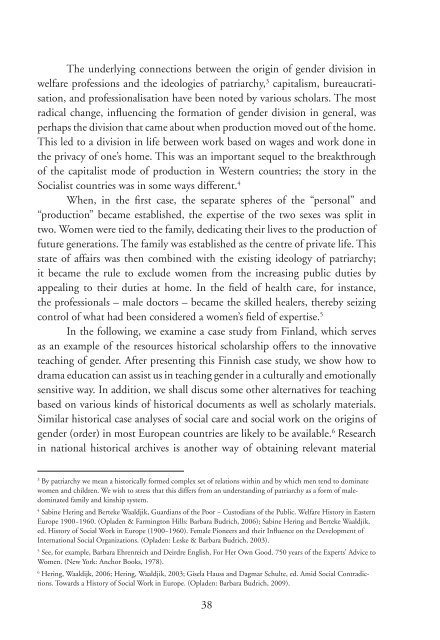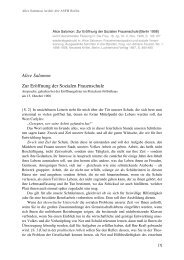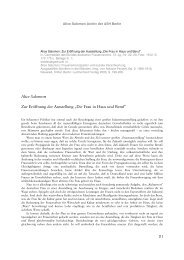Teaching Gender in Social Work - MailChimp
Teaching Gender in Social Work - MailChimp
Teaching Gender in Social Work - MailChimp
You also want an ePaper? Increase the reach of your titles
YUMPU automatically turns print PDFs into web optimized ePapers that Google loves.
The underly<strong>in</strong>g connections between the orig<strong>in</strong> of gender division <strong>in</strong><br />
welfare professions and the ideologies of patriarchy, 3 capitalism, bureaucratisation,<br />
and professionalisation have been noted by various scholars. The most<br />
radical change, <strong>in</strong>fluenc<strong>in</strong>g the formation of gender division <strong>in</strong> general, was<br />
perhaps the division that came about when production moved out of the home.<br />
This led to a division <strong>in</strong> life between work based on wages and work done <strong>in</strong><br />
the privacy of one’s home. This was an important sequel to the breakthrough<br />
of the capitalist mode of production <strong>in</strong> Western countries; the story <strong>in</strong> the<br />
<strong>Social</strong>ist countries was <strong>in</strong> some ways different. 4<br />
When, <strong>in</strong> the first case, the separate spheres of the “personal” and<br />
“production” became established, the expertise of the two sexes was split <strong>in</strong><br />
two. Women were tied to the family, dedicat<strong>in</strong>g their lives to the production of<br />
future generations. The family was established as the centre of private life. This<br />
state of affairs was then comb<strong>in</strong>ed with the exist<strong>in</strong>g ideology of patriarchy;<br />
it became the rule to exclude women from the <strong>in</strong>creas<strong>in</strong>g public duties by<br />
appeal<strong>in</strong>g to their duties at home. In the field of health care, for <strong>in</strong>stance,<br />
the professionals – male doctors – became the skilled healers, thereby seiz<strong>in</strong>g<br />
control of what had been considered a women’s field of expertise. 5<br />
In the follow<strong>in</strong>g, we exam<strong>in</strong>e a case study from F<strong>in</strong>land, which serves<br />
as an example of the resources historical scholarship offers to the <strong>in</strong>novative<br />
teach<strong>in</strong>g of gender. After present<strong>in</strong>g this F<strong>in</strong>nish case study, we show how to<br />
drama education can assist us <strong>in</strong> teach<strong>in</strong>g gender <strong>in</strong> a culturally and emotionally<br />
sensitive way. In addition, we shall discus some other alternatives for teach<strong>in</strong>g<br />
based on various k<strong>in</strong>ds of historical documents as well as scholarly materials.<br />
Similar historical case analyses of social care and social work on the orig<strong>in</strong>s of<br />
gender (order) <strong>in</strong> most European countries are likely to be available. 6 Research<br />
<strong>in</strong> national historical archives is another way of obta<strong>in</strong><strong>in</strong>g relevant material<br />
3<br />
By patriarchy we mean a historically formed complex set of relations with<strong>in</strong> and by which men tend to dom<strong>in</strong>ate<br />
women and children. We wish to stress that this differs from an understand<strong>in</strong>g of patriarchy as a form of maledom<strong>in</strong>ated<br />
family and k<strong>in</strong>ship system.<br />
4<br />
Sab<strong>in</strong>e Her<strong>in</strong>g and Berteke Waaldjik, Guardians of the Poor − Custodians of the Public. Welfare History <strong>in</strong> Eastern<br />
Europe 1900−1960. (Opladen & Farm<strong>in</strong>gton Hills: Barbara Budrich, 2006); Sab<strong>in</strong>e Her<strong>in</strong>g and Berteke Waaldjik,<br />
ed. History of <strong>Social</strong> <strong>Work</strong> <strong>in</strong> Europe (1900−1960). Female Pioneers and their Influence on the Development of<br />
International <strong>Social</strong> Organizations. (Opladen: Leske & Barbara Budrich, 2003).<br />
5<br />
See, for example, Barbara Ehrenreich and Deirdre English, For Her Own Good. 750 years of the Experts’ Advice to<br />
Women. (New York: Anchor Books, 1978).<br />
6<br />
Her<strong>in</strong>g, Waaldijk, 2006; Her<strong>in</strong>g, Waaldjik, 2003; Gisela Hauss and Dagmar Schulte, ed. Amid <strong>Social</strong> Contradictions.<br />
Towards a History of <strong>Social</strong> <strong>Work</strong> <strong>in</strong> Europe. (Opladen: Barbara Budrich, 2009).<br />
38














